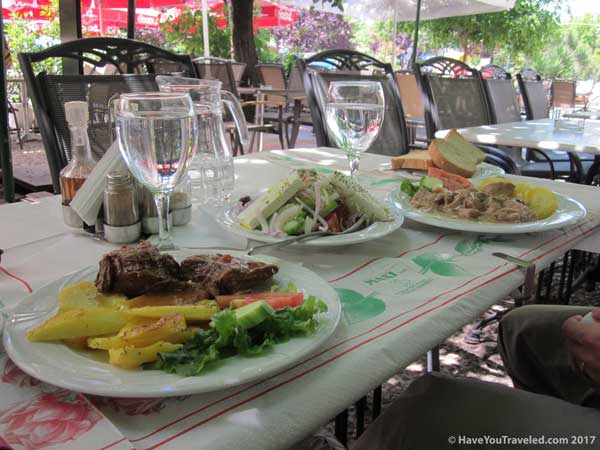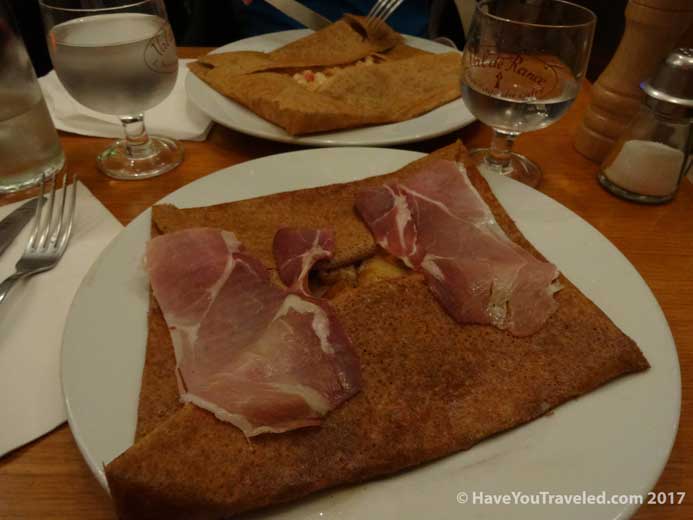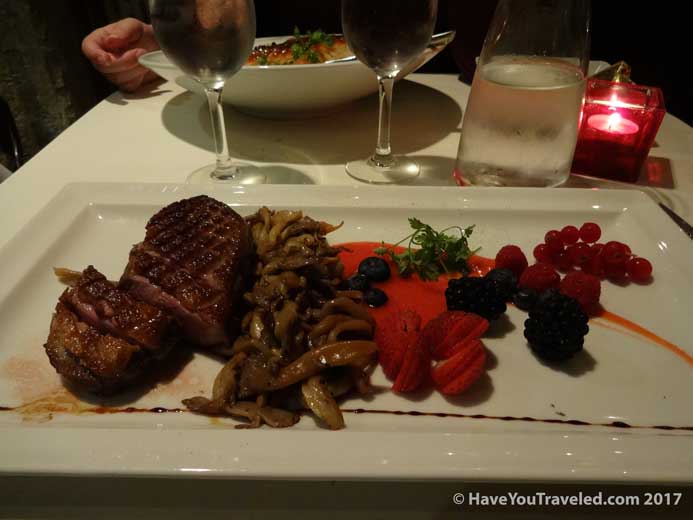I’ll be taking this one.
I’m a pretty anxious person and an anxious traveler. I worry if we’re getting on the right train, if I’m ordering the right food, if we’re in the right line in a queue. But I’m getting better. At some point I just decided that it was ok. I just wasn’t going to let it stop me from trying new things and doing what I wanted. It just meant that maybe going outside my comfort zone was a more incremental process.
Saving up for a year, quitting my job, and putting all my belongings in storage in order to backpack Europe was nerve wracking. At least until I got there and started doing it. Then, huge surprise, it wasn’t bad at all. Lots of people did it. It was pretty fun.
Out of comfort zone ≠ danger
I took a solo trip (i.e., no Betsy) to Vietnam in 2009 to ride a motorcycle down the Ho Chi Minh trail.
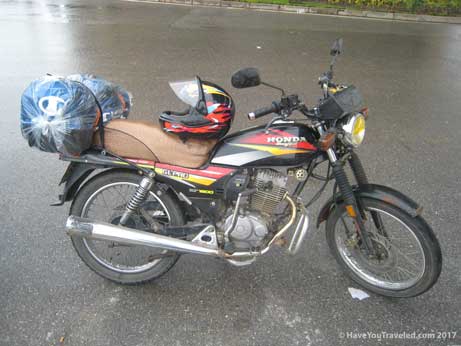
Rode through jungle and small villages for 10 days. Me, a couple local guys, and a handful of strangers zooming through the countryside all day every day. This was not outside my comfort zone. This was like being batman. A damp and dirty batman. No speed limits, flooded streets, water buffalo dodging, beautiful landscape, it was great.
On the last day of the trip we were caught in a wicked storm. When we stopped at a beach side gas station to refuel the guides showed us on a map that the East China Sea was actually supposed to be 5 kilometers away, not 50 feet.
We didn’t know it at the time but we were riding into Typhoon Ketsana. E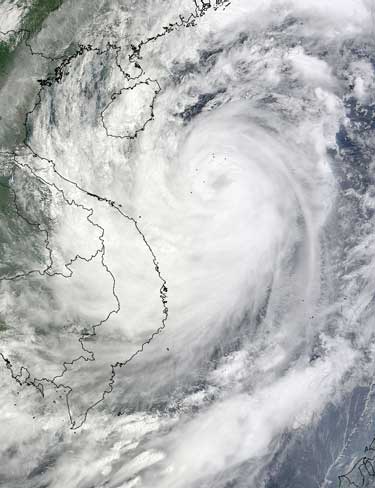 ventually making it to our destination, the streets were flooded and the government had already shut off the electricity. Our hotel even lost part of its roof that night. Wet, dirty, and tired but still not out of comfort zone.
ventually making it to our destination, the streets were flooded and the government had already shut off the electricity. Our hotel even lost part of its roof that night. Wet, dirty, and tired but still not out of comfort zone.
Still, the most stressful part of the trip for me was eating. True, the food was less to my liking (tasteless vegetables and tiny pieces of meat) but really I was self-conscious about being a “tourist” in people’s homes (I brought my iPod for goodness sake). The people were very kind and friendly and generous, as most people are. I was just uptight. They weren’t looking to rehash foreign policy or remove me from my money. They just had a guest in their home and wanted to know where I’ve been and about my family. And perhaps how I could be so bad with chopsticks. Legitimate concern.
Danger wasn’t the point, being more comfortable with myself around people of different backgrounds especially when I was a guest in their home, was where the growth and the broadened perspective happened.
Baby steps are ok
Getting out of my comfort zone is something I try to do in every trip, both for myself and for our family. It might be something small. It might be something you could do without even thinking but the goal is to not let it stop me from experiencing a little more of the world. (And, since becoming a dad, a big motivator is to really try and avoid passing my inhibitions and anxieties to the kids.)
You don’t have to buy one of the big giant joints we saw people walking out of “coffeeshops” with in Amsterdam. We didn’t. We don’t even drink. We don’t even drink coffee. We’re certainly not obligated to change who we are just because we’re in a different country. The point isn’t to just do something weird or unknown just because it is so. The goal is to expand that comfort zone, at a rate or to a degree at which you think is appropriate. Progress is the name of the game. Whether you’re a tortoise or hare, as long as you’re moving forward.
Below are some small but meaningful things that one might do to expand our comfort zone.
-
- Speaking foreign language to native speakers
-
- We do this every trip:
-
- good morning sir/madam
-
- Do you speak English?
- Where is the bathroom?
-
- We do this every trip:
-
- it’s polite, shows that you’re trying and is appreciated by everyone
- (they will likely answer in English)
-
- Speaking foreign language to native speakers
-
- Interacting with people
-
- hire a local guide to show you around the town or village you’re visiting (highly recommended)
-
- ask for directions
- slightly more advanced…get comfortable with bartering (where and when appropriate)
-
- Interacting with people
-
- Dabble in the arts
-
- Going to Vienna? Get to know some classical music
-
- Some strange German guy keep coming up in your Renaissance reading? Figure out who is Albrect Dürer is.
- Going to Sevilla, Spain? Check out some flamenco dancing. (We did!)
-
- Dabble in the arts
-
- New ideas, perspectives; for example:
-
- Soviet role in European theatre is often seen as a determining factor that USA. Interesting to consider multiple perspectives.)
- School system and government model of Scandinavian countries as compared to Mediterranean counties, or far east of North America.
-
- New ideas, perspectives; for example:
- Food
-
- I once ate raw beef in Romania (really chewy)
-
- After Greece, I can no longer eat salad without cheese, olive oil and vinegar (so. good.)
-
- Crepes is Paris were not my favorite part.
-
- Trying duck for the first time later that night, was, however.
- We regret not getting into the tapas scene while in Spain. We probably could’ve tried a little harder but next time we’ll definitely explore this more.
-
This travel principle can turn a good trip into a great trip. “I’m going to be brave, dad” is how our son frames it before he tries new food or something he’s unsure of. Trying a few new things and working to expand that comfort zone continues to be so rewarding for me and our family.
“If you reject the food, ignore the customs, fear the religion and avoid the people, you might better stay at home.” – James A. Michener
With our kids
We work on the idea of “new food” almost year round. Our son (4) has entered a pickier stage but still can eat meats, vegetables, fruits, some pastas, rice, etc. We just want him to be able to have some choices when we are out and about and eating in a restaurant (as opposed to breakfasts at the apartment and sandwiches for lunches). Our daughter will eat whatever you put in front of her. It’s very helpful.
We also talk about some phrases like “buenos dias, señora” but really we’re just planting the seeds for future interactions. We just want them to understand why dad is using different (high school level Spanish) words with strangers.
Last, and covered in subsequent posts, we try to move outside of our comfort zone as a family unit when traveling. It’s tempting to find a cozy apartment and only leave for 1-2 hours, see the sights, and then come back and read books or watch tv. But eating when and where locals do is part of the joy of travel. Using public transport to get in and out of town for a day trip makes for a little adventure and ups your traveler IQ.
A few starting points for older kids:
- 7+ – greetings, numbers, a few phrases, “unique” foods to be ready for, maybe the could order their own food!
- 10+ – same as above, add charging them with finding music or art they might want to learn more about (frescoes in Florence, for example)
- 13+ – same as above, add…
- just like the parents, they can consider different views of society;
- talk to them about differences/similarities, ask them questions that challenge preconceptions (they might be more open minded than you think:))
- see if they are brave to talk to introduce themselves to someone their age (who almost certainly also speaking English, presuming that is your native language)
Dan
Family Conversation topic: What would you “assign” each person in your family a job to help keep the group happy and healthy?
Who can memorize “Donde esta los sevicios?” or do the conversion rate for shopping (bigger kids)? Who is in charge of greeting people when entering museum, restaurants, shops? (little kids can say “Bonjour, madame!” Who will remember a few fun facts about a sight you visit tomorrow? Who’s brave enough to try a new food every day??

